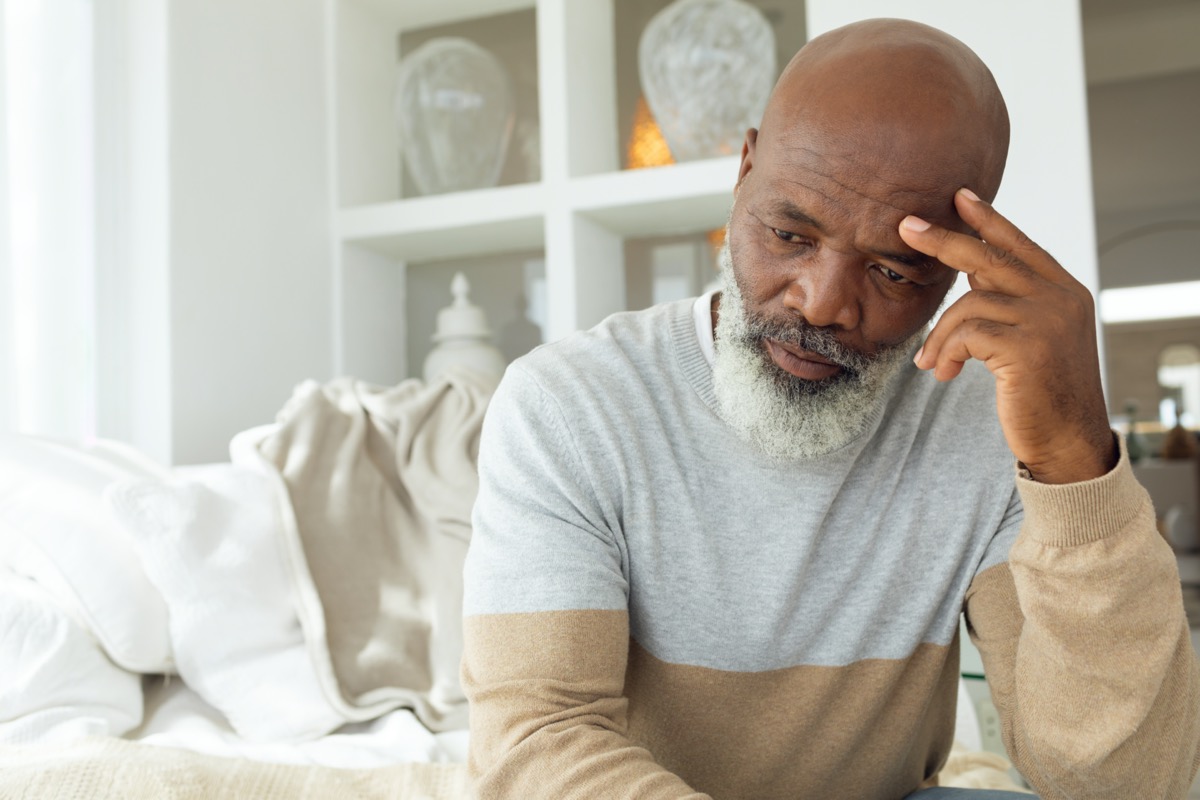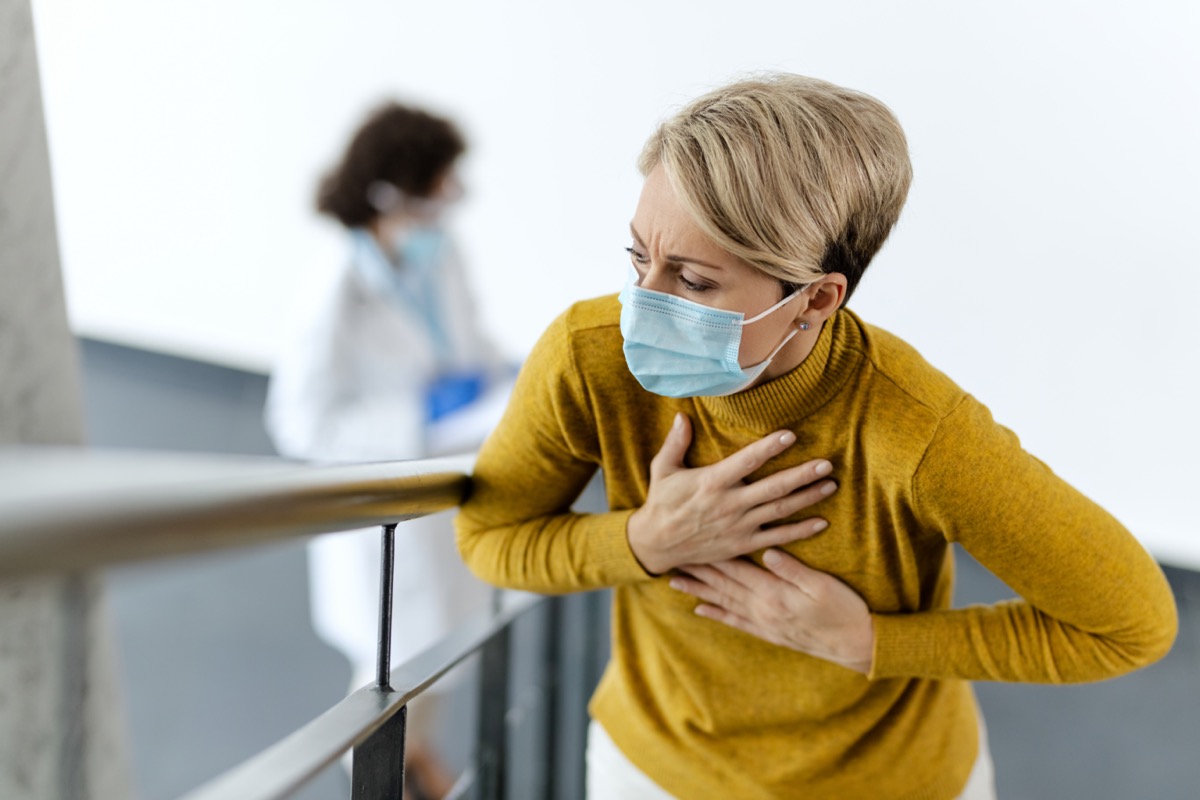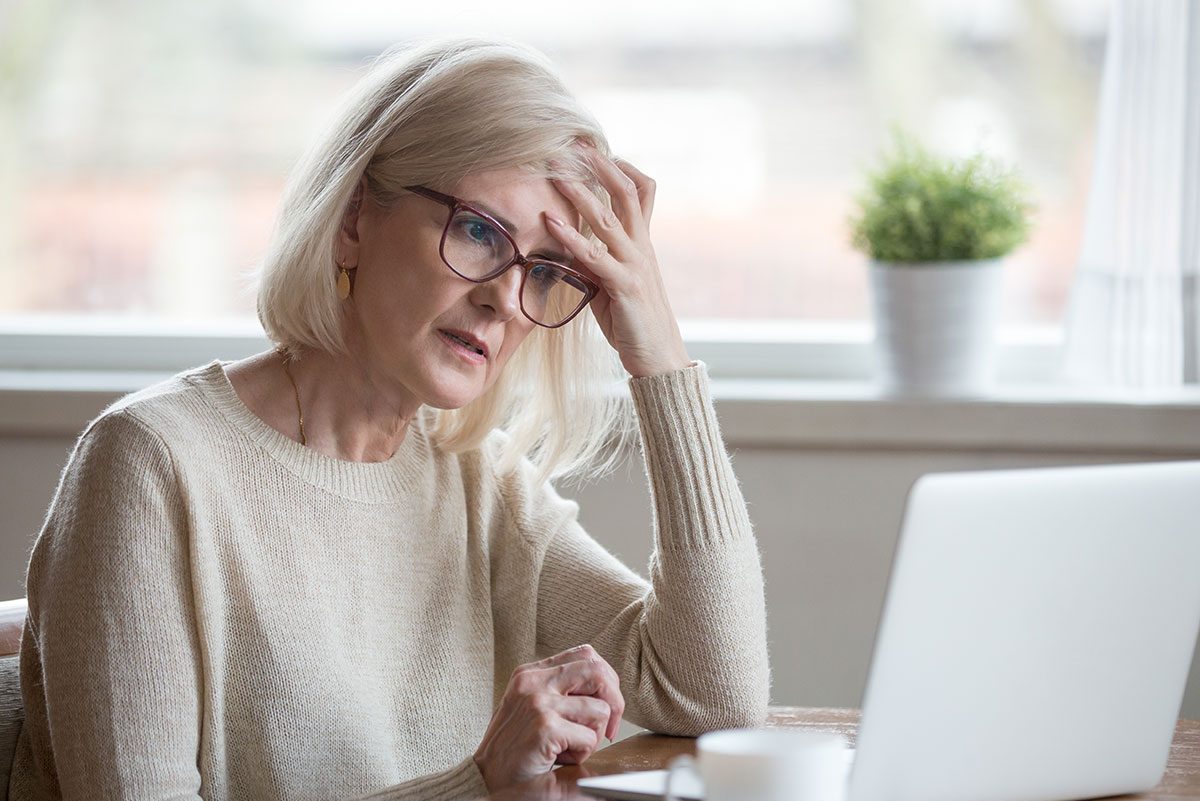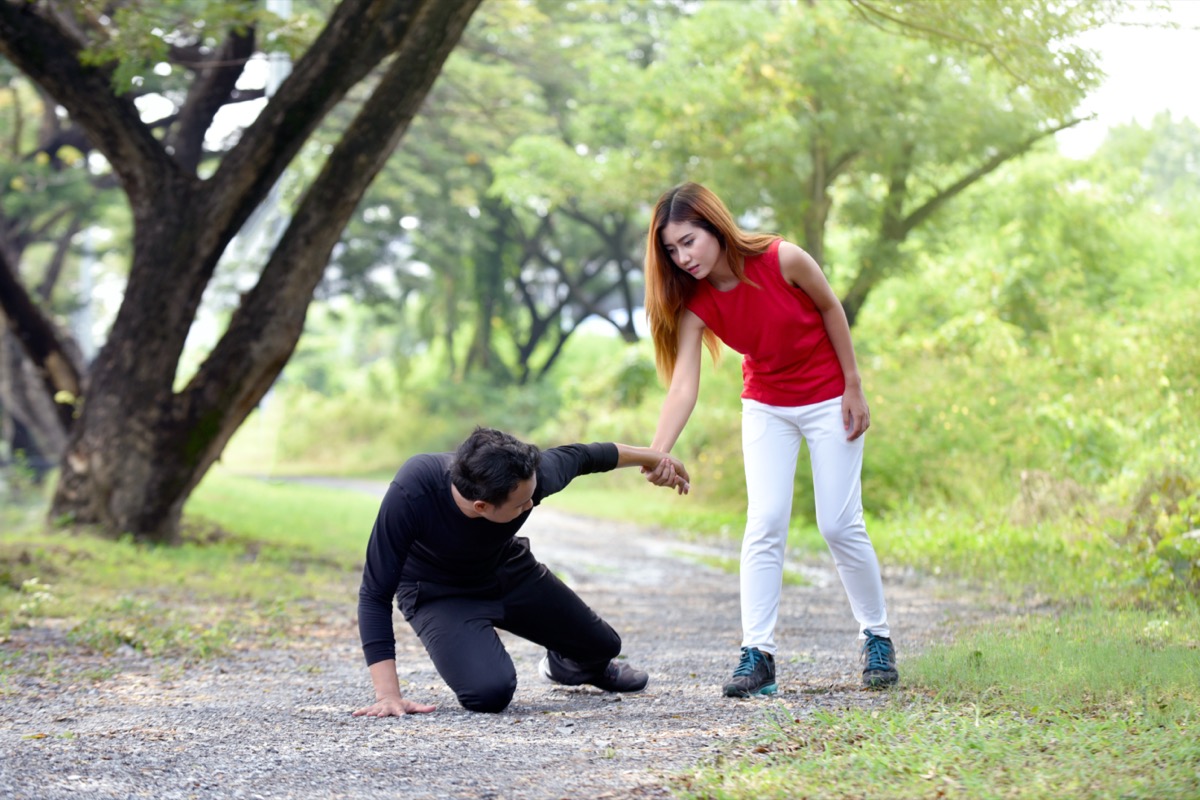Although COVID isn't going anywhere just yet, restrictions and safety guidelines have eased up drastically. Many areas are still seeing an uptick of cases and trying to protect yourself against the virus is vital for your overall health, especially if you're immune-compromised or in the senior community. Eat This, Not That! Health spoke with experts who share how COVID affects older folks and symptoms to pay attention to. Read on to find out more—and to ensure your health and the health of others, don't miss Already Had COVID? These Symptoms May "Never Go Away".
Dr. Bill Lang, Medical Director, WorldCLinic says, "Many of the typical symptoms of COVID are caused by the body's immune system reacting to COVID. In older patients, that response may not be as robust, so fever, chills, and muscle ache/pains may not be as pronounced. On the other hand, fatigue and altered mental status are more common and easily misidentified as just part of being older."
Dr. Tomi Mitchell, a Board-Certified Family Physician with Holistic Wellness Strategies adds, " I am sure many of you are sick and tired of hearing about COVID. Whatever happened? 'COVID being over by the summer,' as some officials falsely proclaimed. COVID has impacted our world profoundly. It's been going on three years since this virus was first discovered, and we have plenty of collective experience highlighting important points about COVID. So I think it's fair to say that you would be hard-pressed to find someone who has never had COVID or someone who doesn't know someone with COVID. Typically, COVID impacts the older population more severely than younger populations. Also another important point to note is that as we mature, our response to infections might change. A senior individual's medical history might impact how they respond to illness, and in some cases, the symptoms of COVID might be very subtle."

Dr. Lang emphasizes, "These are the two biggest things to keep in mind:
- While the combination of newer variants and widespread partial immunity have made COVID more like a 'cold,' it can still pack a wallop, especially in older people who may have other conditions that either decrease the effectiveness of their immune system or increase the susceptibility of some bodily systems to the effects of the virus.
- For adults, and especially seniors, the data is clear and irrefutable: Vaccinations save lives and decrease illness. While it is true that protection against symptomatic illness decreases over time since vaccination, even long after completion of vaccination series, most people still have enough protection that severity of disease and risk of hospitalization and death is reduced."

Dr. Lang states, "In both acute COVID and long-COVID, fatigue can be a prominent symptom, especially in older people. One of the most important ways to fight fatigue once other symptoms abate after the first 5-6 days is to push yourself to overcome the lethargy to get out and about. In older people, other physical issues may make this more difficult and that can exacerbate the problem. Treat activity like medicine…it's something you have to do everyday whether you want to or not."
Dr. Mitchell shares, "We know that fatigue is a common side effect of things from a common cold to cancer. As we mature, our energy levels might have more ebbs and flows, and energy levels might drop in advanced age. So, if an individual's baseline energy level is low or naturally prone to these ebbs and flows, caregivers, family, and even the individual might quickly chalk the symptoms off to 'old age.' For example, seniors might find that they are sleeping more and taking more daytime naps, not realizing that their body is fighting COVID. If the senior also has cognitive decline and perhaps has had a stroke in the past, it might be more challenging to recognize a change. Fortunately, most people recover from their COVID-related fatigue in 2 weeks, whereas those with more severe cases might take up to 6 weeks or more to recover. We are over two years into the pandemic, and we are seeing more and more patients with long COVID. So long COVID is defined as symptoms of COVID lasting more than three months."

According to Dr. Mitchell, "Chronic obstructive pulmonary disease or COPD is a common condition affecting over 15 million Americans yearly, and many might not be aware of this disease. A whopping 150 000 die of COPD every year. In this condition, shortness of breath is a common symptom. With more advanced stages of this disease, individuals with COPD might require home oxygen. A senior with COPD might not realize that they are infected with COVID due in part that they already had shortness of breath. Another common illness, congestive heart failure (CHF), which affects about 6.8 million Americans yearly, is a condition senior and care providers need to be aware of. In this condition, the heart isn't functioning correctly. This results in the pooling of blood and fluid building up in the lungs, contributing to shortness of breath. Interestingly, CHF can cause an increase in coughing and wheezing, which can also be seen in a COVID infection. In addition, the overlap in symptoms can contribute to the 'silent & masked symptoms' of COVID. Breathing challenges from COVID can last for months or longer. For example, individuals experiencing breathing symptoms might require respiratory therapy, breathing exercise, and prescription medications. Therefore, you must talk to your health care provider to get health advice tailored to your unique situation."

Dr. Mitchell says, "People commonly joke and say, 'they are having a senior moment' when they have lapses in their memory. However, for seniors, this lapse in memory and associated confusion might signal an underlying infection. There are so many causes for confusion, from urinary tract infections to dementia, and neurological disorders, to name a few. All of these conditions are more common in the elderly. However, confusion in COVID patients might indicate that they have COVID and are fighting for their life. If you or your loved one is experiencing a change in their cognitive status, please make sure you speak to your health care providers and consider getting tested for COVID."
Dr. Lang adds, "In older people, it is not uncommon to have these symptoms after a prolonged bout of illness that keeps them in bed. Fight this in a manner similar to the physical activity recommendations for symptom #1: Stay mentally active. Don't give in to just watching mindless television: Stay actively engaged mentally interacting with friends and families, working puzzles, analyzing more complex problems, even writing out analyses or picking through the arguments in other people's analyses of issues."

Dr. Mitchell emphasizes, "Changes in appetite are common as we age. Plus, certain medications and medical conditions can impact appetite. However, loss of appetite is one of those atypical symptoms of COVID 19 in seniors. COVID has been shown, in some cases, to show changes in taste and smell, which can make food unappealing. Research has demonstrated strategies to improve food appeal to COVID patients, and one of these strategies is to focus on one's favorite food and being in a comfortable environment. Changes in appetite can be concerning, and one should be aware that transitions from an individual's baseline might signal an underlying infection, like COVID.
As with the other symptoms, loss of appetite might only last for a few days, but in some, it might last longer. For example, a recent study from Stanford Medical School found that 70% of COVID patients still had symptoms months after recovering from the disease."
Dr. Lang says, "In reality, this may just be a component of Symptom #1, but COVID can cause changes in, or even loss of, taste and smell. The disease can also cause some degree of GI upset, including mild nausea or diarrhea. All of these things can contribute to a lack of interest in food. Older adults are often more sensitive to inadequate diets and this can contribute to the above problems of fatigue, lethargy, confusion, and forgetfulness. Again, think of food as medicine. Even if it's not something pleasurable, a good balanced diet is important to recovery. Addition of various nutritional and calorie supplements (for example, supplements like Ensure) can be critical. Adding additional flavor to food can also help overcome some decrease in taste/smell and make eating more pleasurable."

Dr. Mitchell shares, "As a physician, who has done a lot of work in geriatric care, I am aware of the risks of falls in the elderly. Physicians try to avoid certain medications and medication combinations to mitigate this risk. For patients taking pills for their blood pressure, we must be cautious not to overcorrect the blood pressure and inadvertently have the medication contribute to a patient falling. Falls in seniors can also happen if they go from sitting or lying to standing too quickly. Also, poor vision, weakness, and home hazards are just a few of the many reasons a senior might fall. Research has shown that falls and slips have been the most common cause of hip fractures in seniors during the pandemic. As a result, COVID puts seniors at increased risk for falls. It is important to note that body deconditioning, where an individual significantly reduces physical activity, can increase your risk of falling. For example, during the pandemic, millions of seniors had substantial lockdowns and social isolation, putting them at risk for deterioration in their health and physical deconditioning. The reduction in stability and strength puts one at an increased risk of falling. Infections with COVID can increase fall risk due to other complications of the disease such as fatigue, confusion, and weakness, to name a few. However, I would like to point out that falls can be due to an infection, such as COVID, and we need to be aware of it."

Dr. Lang explains, "The technical term for this is 'anhedonia' which (almost) literally translates to "no fun." This is closely related to fatigue and lethargy but is more mental than physical lethargy. Whether COVID or another subtle illness, when an older person loses interest in doing those things they typically like to do, whether it's watching the stock market, going into their garden, interacting with grandkids, or any other activity they have typically enjoyed, it's time to look for other causes and today, COVID should be high on the list." And to protect your life and the lives of others, don't visit any of these 35 Places You're Most Likely to Catch COVID.
The post Silent Symptoms of COVID Seniors Need to Know appeared first on Eat This Not That.
----------------
By: Heather Newgen
Title: Silent Symptoms of COVID Seniors Need to Know
Sourced From: www.eatthis.com/news-silent-symptoms-of-covid/
Published Date: Wed, 22 Jun 2022 11:01:20 +0000
Read More
Did you miss our previous article...
https://naturesmart.us/fitness/get-rid-of-armpit-fat-with-this-10minute-daily-workout-trainer-says
 HealthWellnessFitnessBeautyVideosPrivacy PolicyTerms And Conditions
HealthWellnessFitnessBeautyVideosPrivacy PolicyTerms And Conditions
